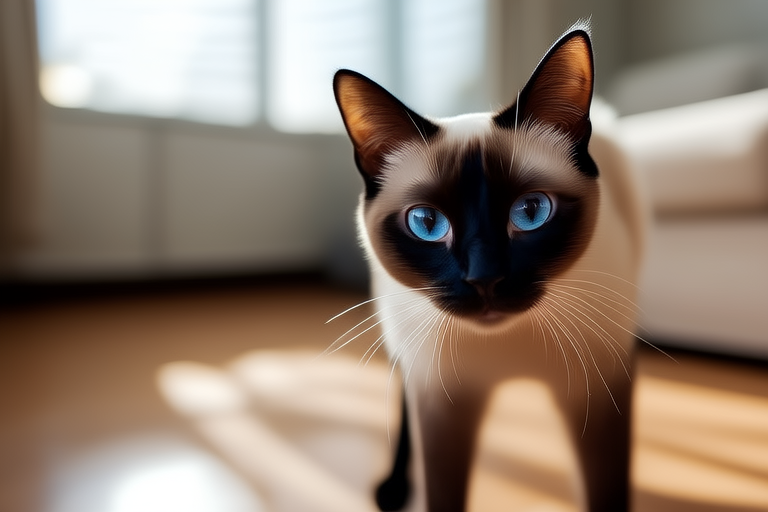Siamese Cats: The Ultimate Guide to Living with a Vocal Companion
Welcome to the world of Siamese cats, one of the most fascinating and beloved breeds among cat enthusiasts. Known for their striking blue almond-shaped eyes, sleek coats, and distinctive vocalizations, Siamese cats are more than just pretty faces. They are intelligent, affectionate, and often quite demanding of attention. This comprehensive guide will help you understand and enjoy living with your Siamese companion.
The Vocal Nature of Siamese Cats
Siamese cats are famous for their talkative personalities. Their vocalizations can range from soft chirps and meows to loud, insistent cries. This trait is deeply rooted in their ancestry, where they were bred to alert their human companions of potential dangers or simply to seek attention. Understanding why they vocalize can help you manage their communication effectively.
Siamese cats tend to be more vocal during the day when they are awake and active. They often communicate their needs or desires, such as food, playtime, or affection. Some owners find it challenging to deal with the constant chatter, but it’s important to recognize that this behavior is part of their natural disposition. By establishing routines and ensuring their physical and emotional needs are met, you can reduce excessive vocalization.
Typical Health Concerns
Siamese cats, like all breeds, have certain health issues to which they are predisposed. Regular veterinary check-ups and a good understanding of these conditions can help ensure your cat lives a long and healthy life.
- Respiratory Problems: Siamese cats are prone to upper respiratory infections due to a genetic predisposition. Early intervention and proper care are crucial.
- Dental Issues: Dental disease is common in Siamese cats, so maintaining good oral hygiene is essential.
- Eye Problems: These cats are susceptible to eye disorders such as progressive retinal atrophy (PRA), which can lead to blindness. Regular eye exams can catch these issues early.
- Cardiac Issues: Some Siamese cats may develop heart problems, particularly hypertrophic cardiomyopathy (HCM). Monitoring your cat’s activity level and consulting a vet if you notice any changes can be beneficial.
Regular visits to the veterinarian and maintaining a healthy lifestyle can mitigate many of these risks. A balanced diet, regular exercise, and a clean living environment contribute significantly to your Siamese cat’s overall well-being.
Grooming Needs
Siamese cats have short, fine coats that require minimal grooming. However, they still need regular brushing to keep their coat shiny and free from tangles. Brushing also helps distribute natural oils throughout the fur, promoting skin health.
Bathing is generally not necessary unless your cat gets into something messy. Use a gentle, cat-specific shampoo and ensure thorough rinsing to avoid irritation. Additionally, pay special attention to their ears, cleaning them gently with a cotton ball and ear-cleaning solution recommended by your vet.
Trimming nails regularly is important, as overgrown nails can cause discomfort and lead to scratching furniture or other surfaces. It’s advisable to start nail trimming when your cat is young to make it a routine they are comfortable with.
Dietary Requirements
Feeding your Siamese cat a balanced diet is crucial for maintaining their health. High-quality commercial cat foods that meet AAFCO standards are generally sufficient. Look for options that include protein sources like chicken, turkey, or fish, along with carbohydrates and fats that provide energy. Always ensure fresh water is available at all times.
Avoid feeding your Siamese table scraps, as they can upset their digestive system and lead to obesity. Treats should be given sparingly and should not exceed 10% of their daily caloric intake. Obesity can exacerbate existing health issues and shorten lifespan, so monitoring portion sizes and maintaining a healthy weight is vital.
If you choose to feed homemade meals, consult with your veterinarian to ensure you’re providing a nutritionally complete diet. Homemade diets can be beneficial, but they must be carefully balanced to meet all nutritional needs.
Training and Socializing Your Siamese Cat
Siamese cats are highly intelligent and trainable. They respond well to positive reinforcement techniques, making training an enjoyable experience for both you and your pet. Start by teaching basic commands such as ‘sit,’ ‘stay,’ and ‘come.’ Use treats and praise to reward desired behaviors, encouraging repetition.
Socialization is equally important. Introduce your Siamese cat to various environments, people, and other animals from an early age to prevent shyness or aggression. Gradual exposure to different stimuli helps them become confident and adaptable.
Interactive toys and puzzle feeders can stimulate their minds and keep them entertained. These activities help channel their energy into constructive outlets, reducing destructive behaviors like scratching furniture or knocking items off shelves.
Living Harmoniously with a Talkative Cat
Living with a Siamese cat requires patience and understanding. Here are some practical solutions to help you coexist peacefully with your vocal companion:
- Establish a Routine: Consistency helps reduce anxiety and unnecessary vocalizations. Feed, play, and groom your cat at the same times each day.
- Provide Mental Stimulation: Engage your Siamese in interactive play sessions and provide stimulating toys to keep them mentally active.
- Use Calming Techniques: If your cat becomes overly vocal, try using calming aids like pheromone diffusers or playing soft music to soothe them.
- Encourage Quiet Time: Teach your cat that quiet time is rewarding. Praise them when they are calm and offer treats as positive reinforcement.
By addressing their needs promptly and consistently, you can foster a peaceful household environment where both you and your Siamese cat thrive.
Conclusion
Siamese cats are delightful companions known for their intelligence, affection, and vocal nature. With proper care, training, and attention to their unique needs, you can enjoy a fulfilling relationship with your Siamese cat. Embrace their quirks and enjoy the joy they bring into your home. Remember, every Siamese cat is an individual, so take the time to understand and bond with yours. Happy cat parenting!
